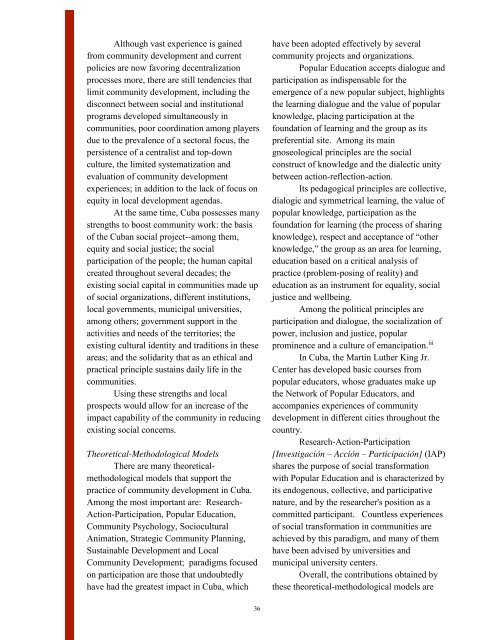CLC-Conference-Proceeding-2018
Create successful ePaper yourself
Turn your PDF publications into a flip-book with our unique Google optimized e-Paper software.
Although vast experience is gained<br />
from community development and current<br />
policies are now favoring decentralization<br />
processes more, there are still tendencies that<br />
limit community development, including the<br />
disconnect between social and institutional<br />
programs developed simultaneously in<br />
communities, poor coordination among players<br />
due to the prevalence of a sectoral focus, the<br />
persistence of a centralist and top-down<br />
culture, the limited systematization and<br />
evaluation of community development<br />
experiences; in addition to the lack of focus on<br />
equity in local development agendas.<br />
At the same time, Cuba possesses many<br />
strengths to boost community work: the basis<br />
of the Cuban social project--among them,<br />
equity and social justice; the social<br />
participation of the people; the human capital<br />
created throughout several decades; the<br />
existing social capital in communities made up<br />
of social organizations, different institutions,<br />
local governments, municipal universities,<br />
among others; government support in the<br />
activities and needs of the territories; the<br />
existing cultural identity and traditions in these<br />
areas; and the solidarity that as an ethical and<br />
practical principle sustains daily life in the<br />
communities.<br />
Using these strengths and local<br />
prospects would allow for an increase of the<br />
impact capability of the community in reducing<br />
existing social concerns.<br />
Theoretical-Methodological Models<br />
There are many theoreticalmethodological<br />
models that support the<br />
practice of community development in Cuba.<br />
Among the most important are: Research-<br />
Action-Participation, Popular Education,<br />
Community Psychology, Sociocultural<br />
Animation, Strategic Community Planning,<br />
Sustainable Development and Local<br />
Community Development; paradigms focused<br />
on participation are those that undoubtedly<br />
have had the greatest impact in Cuba, which<br />
have been adopted effectively by several<br />
community projects and organizations.<br />
Popular Education accepts dialogue and<br />
participation as indispensable for the<br />
emergence of a new popular subject, highlights<br />
the learning dialogue and the value of popular<br />
knowledge, placing participation at the<br />
foundation of learning and the group as its<br />
preferential site. Among its main<br />
gnoseological principles are the social<br />
construct of knowledge and the dialectic unity<br />
between action-reflection-action.<br />
Its pedagogical principles are collective,<br />
dialogic and symmetrical learning, the value of<br />
popular knowledge, participation as the<br />
foundation for learning (the process of sharing<br />
knowledge), respect and acceptance of “other<br />
knowledge,” the group as an area for learning,<br />
education based on a critical analysis of<br />
practice (problem-posing of reality) and<br />
education as an instrument for equality, social<br />
justice and wellbeing.<br />
Among the political principles are<br />
participation and dialogue, the socialization of<br />
power, inclusion and justice, popular<br />
prominence and a culture of emancipation. iii<br />
In Cuba, the Martin Luther King Jr.<br />
Center has developed basic courses from<br />
popular educators, whose graduates make up<br />
the Network of Popular Educators, and<br />
accompanies experiences of community<br />
development in different cities throughout the<br />
country.<br />
Research-Action-Participation<br />
[Investigación – Acción – Participación] (IAP)<br />
shares the purpose of social transformation<br />
with Popular Education and is characterized by<br />
its endogenous, collective, and participative<br />
nature, and by the researcher's position as a<br />
committed participant. Countless experiences<br />
of social transformation in communities are<br />
achieved by this paradigm, and many of them<br />
have been advised by universities and<br />
municipal university centers.<br />
Overall, the contributions obtained by<br />
these theoretical-methodological models are



